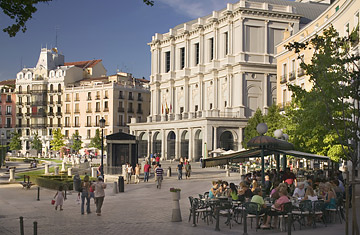
People enjoy an outdoor cafe in Madrid's Plaza de Oriente.
It's a Thursday evening and the outdoor tables at Madrid's Cervecería San Andrés are, as usual, packed with locals cheerfully gabbing away and downing cold glasses of beer. The convivial scene betrays no hint of the recession bearing down on the Spanish economy. Gathered around one table, five gregarious coworkers from a local information-technology firm seem impervious to the downturn. So far, they say, their industry hasn't felt the pinch. Press them a little, though, and their anxiety starts to surface. All have stories about a friend who has lost a job, a relative forced to sell a second home. But none is quite sure what to make of these signs, because they are all under 35, and this is the first time in their working lives that the Spanish economy has flagged.
Until recently, Spain's growing prosperity was something young Spaniards took for granted. In the last decade and a half, the country's gross national product more than doubled, and from 2000 to 2007 the average salary jumped from $35,500 to $42,400. That boom meant easy opportunities for university graduates. "You'd get out of school and have a job within three weeks, tops," says David Jiménez, 31. But that was before economists began predicting that Spain's economy, which grew by 3.8% in 2007, would be lucky to eke out 1.8% in 2008. Inflation now stands at 5.3%, almost a full point higher than the European Union average, and the unemployment rate hit 10.7% in June, the worst in the E.U. On Aug. 12, faced with a barrage of grim economic news, Prime Minister José Luis Rodríguez Zapatero cut short his vacation to convene an emergency session with his cabinet. The following day he announced a relief package that suspends the inheritance tax, boosts subsidies for low-income housing and provides more financing for small businesses.
Most job losses have come in the real-estate and building sector, which contributed 12.2% to GDP in 2006 but is now in crisis. Sure enough, Jiménez has a friend who has lost his construction job. But as the five talk about the people they know who are now unemployed, the list of affected sectors grows. "I know some teachers in private schools who have lost their jobs," says Jiménez's colleague, Vicki Marcos, 30. "The parents don't have money for their kids' education anymore." Juan Antonio Salguero, 27, says: "A friend of mine who worked for a hospital for years just didn't get his contract renewed." Adrian de la Horra, 25, joins in: "Don't forget the civil service. They're cutting back too."
And so the conversation goes: a general sense of well-being gives way to lurking uncertainty. Sergio Sánchez, 30, says he's been unable to get a mortgage. Jiménez has opted to live with his parents to save money. Salguero, who moved to Madrid from Seville a year ago, has cut back on trips home because of high gas prices. "And let's not even talk about bread," he adds. "Do you know that the cost of a loaf has doubled in the time I've been here?" Marcos nods. "They're small things, but they're starting to add up," she says. "By the end of the year, I think we're all going to notice it a lot more."
The group already notices the difference between their generation and earlier ones. Franco's dictatorship kept the economy closed almost into the 1960s, and even after that, Spain's development lagged behind that of other Western European countries. "People who lived through the war and the dictatorship were careful with their money," says Sánchez. "But now everyone thinks they have a right to buy a car and take vacations at the beach. So they take out loans to do it."
The coworkers at this table are no longer certain that they'll be better off than their parents. "My mother, all of our mothers, stayed at home while my dad worked," says Marcos. "But now, if you're going to have a family, you need two salaries: one to pay the mortgage, and one to live off." Jiménez has an even bleaker outlook: "To me, being middle class means owning a home and a car," says the university-educated engineer. "I don't know if I'll ever be able to do that." For a generation of Spaniards raised to expect progress, this is a rude awakening.
